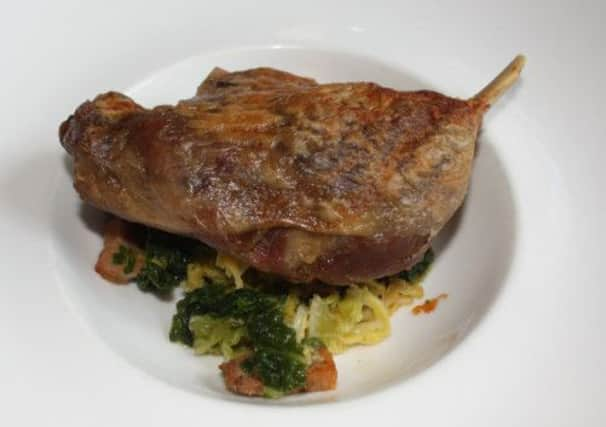Recipes:Mixed Pickles|Confit Duck/Leg|Rowan Jelly


Now is the time to pickle, cure and preserve the surplus for the colder months ahead, as generations have done before us. As thrifty, canny Scots this will make our pennies go a wee bit further.
Flicking through some old cookery books by the likes of Meg Dods, F Marian MacNeil and William Heptinstall, there are recipes for pickles of all sorts; cabbage, onions, cauliflowers, beans, and even mushrooms. One of these, dated 1805, describes how to “mango a cucumber”, which involves pickling it for four days, stuffing with spices (ginger, pepper, garlic, mace, nutmeg, cloves) and tying it with thread before popping it in a pot with water and vinegar and heating it on the fire.
Advertisement
Hide AdAdvertisement
Hide AdRillettes, pâtés and terrines, bottled apples and pears, were all prepared to ensure the cupboard was never bare in the long dark days ahead. A stranger could always be welcomed around your hearth and offered bread, cheese (another type of preserving) or a ham hanging from the chimney (where it cured in the smoke of the peat or wood).
These books, recipes and traditions that form our cultural heritage must be continued, and I feel strongly that it’s my duty to pass them on to ensure they are not abandoned in this increasingly homogenised world.
My recipes this week are simple and easy to follow - happy preserving!
SHOPPING LIST
MIXED PICKLES
2 medium cucumbers, or 1 small cauliflower, or 4 or 5 carrots – or a combination
250ml cider vinegar
250ml water
250g unrefined caster sugar
a few peppercorns
1 bay leaf
1 star anise
salt to taste
CONFIT DUCK LEG
4 free-range duck legs
2 large handfuls of coarse sea-salt
a few sprigs of thyme
4 cloves of garlic, sliced
a few juniper berries
a few peppercorns
1 bay leaf
500g duck fat (available from all good supermarkets and delis)
ROWAN JELLY
900g rowanberries
700g apples, roughly chopped (skin and all)
around 750g unrefined caster sugar (plus extra)
MIXED PICKLES
At the restaurant we continually cure, pickle, smoke, salt and preserve. It makes economic sense when there is a glut or when the price is low at market, and it’s great fun experimenting. We don’t have to be stuck in the days of gloopy piccalilli and the vinegary beetroot that stained your boiled egg pink; we can do so much more. Pickles can be elegant and a great enhancement to smoked fish, hams and salads.
Makes 6 8oz jars
2 medium cucumbers, or 1 small cauliflower, or 4 or 5 carrots – or a combination
250ml cider vinegar
250ml water
250g unrefined caster sugar
a few peppercorns
1 bay leaf
1 star anise
salt to taste
1. Place all the ingredients in a pot and bring to the boil.
Advertisement
Hide AdAdvertisement
Hide Ad2. Add the desired vegetables and cook for 10-15 minutes in the liquor.
3. Divide the veg into sterilised jars and firmly close lids.
4. Label and store until required. Try playing with other flavoured vinegars and spices.
CONFIT DUCK LEG
We cure our own bacon at Cafe St Honoré, but this week I’ve chosen to confit a duck leg (we get ours from Gartmoor Farm near Alloa). This is a classic French dish where the leg is both cured and cooked. In days gone by it would be kept in an airtight stone jar, coated in the fat, all through the winter. In the restaurant we sell so much that it only lasts a day or so. The leftover fat can be used again and again; use a scoop in your Sunday roast potatoes.
Serves 4
4 free-range duck legs
2 large handfuls of coarse sea-salt
a few sprigs of thyme
4 cloves of garlic, sliced
a few juniper berries
a few peppercorns
1 bay leaf
500g duck fat (available from all good supermarkets and delis)
1. Ensure all feathers are removed from the legs. Remove the end bone using a large knife or cleaver.
2. Make a rub with the salt, thyme, garlic, juniper berries, peppercorns and bay leaf. Massage all over the duck legs. Leave overnight in the fridge. The next day, remove the legs from the fridge and rinse under cold running water. Pat dry using kitchen paper or a cloth.
3. Melt the duck fat in a casserole dish or oven-proof pot, and submerge the legs into it. Bring to a slow simmer, then cover with a lid and place in a pre-heated oven at 100C for 2½ to 3 hours.
Advertisement
Hide AdAdvertisement
Hide Ad4. Leave to cool in the fat, then place into a tub and leave in the fridge until required.
5. Reheat in a hot oven, then under the grill.
ROWAN JELLY
For something sweet, I’m crazy about jellies just now and am making them out of blackcurrants, redcurrants, damsons, and my favourite, the rowanberry. Enjoy some on a slice of toast, in a tart or a Victoria sponge - classic and simple.
Makes 18 8oz jars
900g rowanberries
700g apples, roughly chopped (skin and all)
around 750g unrefined caster sugar (plus extra)
1. Sterilise jars and lids as if making jam by placing in the dishwasher on a short cycle, in the oven for 5 minutes, or in a basin of boiling water.
2. Place the rowan berries and apples with 225g of the sugar into a large pot or jelly pan and add enough water to cover.
3. Bring to a fast boil and gently boil for 20 minutes.
4. Strain through muslin or a jelly bag overnight.
5. In the morning, weigh the strained mixture and place back into a large pot. Add the same weight of sugar (as the strained liquid) to the pot. Bring to a vigorous boil again and boil for 5 minutes.
6. Whilst still hot, pour into the sterilised jars.
7. Label and store until needed.